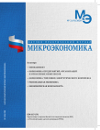Formation of technological solutions for renewable and low-carbon energy projects in oil and gas companies
DOI: 10.33917/mic-2.121.2025.101-105
Technologies largely determine the economic efficiency of project decisions and play a key role in gaining a competitive advantage. Currently, oil and gas companies are faced with the issue of forming a long-term development strategy for emerging energy transition, including setting priorities for allocating funds to the development of technologies in the field of renewable energy sources and low-carbon projects. The article presents the results of systematization and prioritization of such technologies and their use in the development of strategies for «smart investment» in «green» technologies.
References:
1. The Future of Geothermal Energy, International Energy Agency. URL: https://www.iea.org/reports/the-future-of-geothermal-energy
2. How a Technology Similar to Fracking Can Store Renewable Energy Underground Without Lithium Batteries, Incide Climate News. URL: https://insideclimatenews.org/news/27082024/renewable-energy-underground-storage-technology
3. Telegina E.A., Chapaykin D.A. Directions of energy transition in the policy of global oil and gas companies, Problems of forecasting, 2022;5:129-137.





